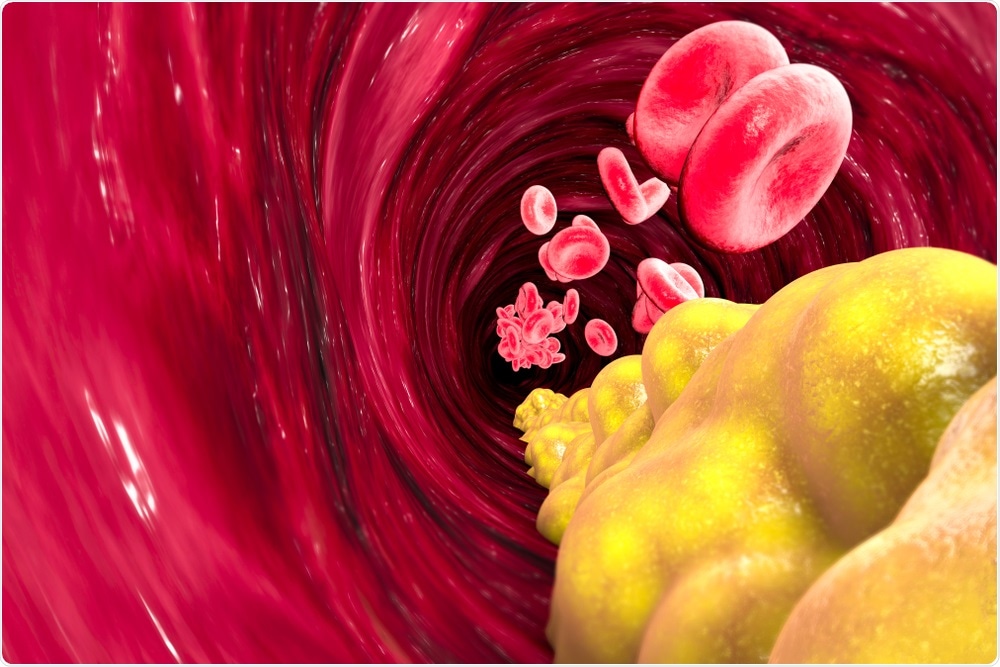Triglycerides have long been treated as a threat to human health after being linked with an increased risk of stroke.
Now, these fat stores found in the blood have been utilized as an effective transportation method of oral medication, which could lead to injections and IV becoming obsolete for some common treatments.

Image Credit: Naeblys/Shutterstock.com
Delivering drugs with triglycerides has 25% absorption rate
Triglycerides are the most common type of fate found in the human body. They are introduced into the bloodstream via the consumption of triglyceride containing foods such as butter and oils. For many years research into triglycerides has focused on uncovering the link between high levels of this type of fat in the blood and an increased risk of stroke and coronary heart disease.
The past two decades have seen multiple scientific studies confirming this link and warning people against introducing too much of this fat type into their bodies.
This month, a study published in the journal Science Advances has demonstrated that these fat stores may be vitally useful in the delivery of drugs. Researchers investigating new nanomedicine delivery systems at Houston Methodist Hospital, Texas, have reported that using triglycerides in drug delivery in mice models results in a 25% absorption rate, a relatively high rate of absorption for oral drugs.
Scientists believe the breakthrough will impact the way biological drugs are delivered in the future, with oral delivery becoming a more viable route, which will likely change the way patients with autoimmune diseases such as rheumatoid arthritis receive treatment.
Diabetes drugs could be administered orally
The human body is accustomed to absorbing fatty acids such as triglycerides. This natural ability to breakdown and absorbs fat molecules into the small intestine, making them available to the bloodstream, is what inspired the team at Houston Methodist in devising an improved method of drug delivery.
The researchers took advantage of this natural function, chemically linking biological drug molecules to triglycerides to hijack the body’s natural affinity for digesting these fatty molecules, leading to high levels of absorption of the drug.
The team found that this “transporter approach” resulted in a 25% absorption rate of the biological drug, a high rate in comparison to the absorption rates of other drugs.
The work had been conducted for over five years before arriving at this breakthrough point. The team designed a successful approach where peptide-based drugs can be attached to fatty acids to treat diabetes.
The molecule of the chemically linked drug and triglyceride was inserted into a nanoparticle that is resistant to being broken down by the stomach’s gastric acids, allowing it to remain intact when reaching the small intestine where it can achieve a higher absorption rate. In the mouse model, the team used they measured a 24.8% absorption rate of the drug dosage, which, while seemingly small is a relatively high rate.
While most small molecule drugs are administered in the form of oral tablets, biological drugs cannot be taken in this way because the drugs perish in the harsh environment of the gastrointestinal tract.
Such drugs required to treat diabetes would not survive the stomach’s digestive enzymes and gastric acids, meaning that until now, these drugs have had to be injected rather than swallowed. Other similar drugs have required administration via intravenous infusion.
The downsides of this form of drug delivery are that they are costly and uncomfortable for the patients. With diabetes, the requirement to administer injections daily also leads to reduced medication compliance rates, increasing complications related to the disease.
The next steps will see the method being tested for the delivery of other biological drugs. First on the list are the human growth hormone as well as therapeutic antibodies.
In addition, scientists will be testing their approach in clinical trials with humans to ensure the drug works in the same way in humans as it does in the mouse model. In several years this research may lead to developing biological drugs that could be administered orally.
Sources:
High Blood Triglycerides Are Independent Risk Factor For Stroke. Available at: https://www.sciencedaily.com/releases/2001/12/011210163853.htm
Fatty acid in triglycerides proves an effective platform for biological drug delivery. Available at: https://www.eurekalert.org/emb_releases/2020-04/hm-fai033020.php
Triglycerides and the Risk of Coronary Heart Disease. Available at: https://www.ahajournals.org/doi/10.1161/circulationaha.106.637793